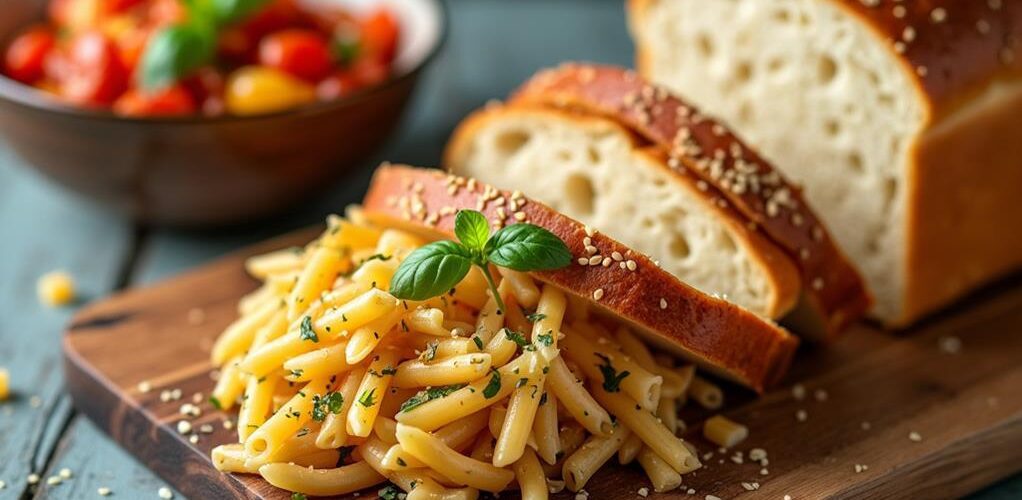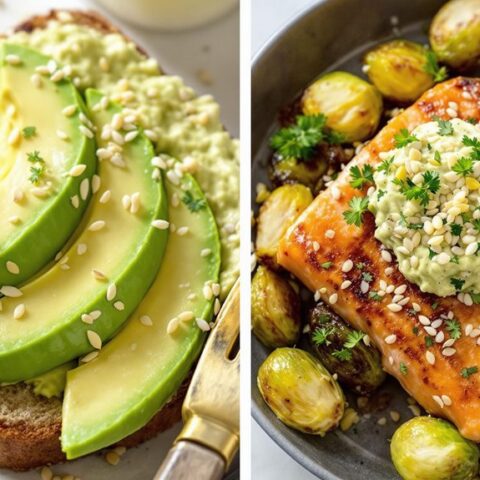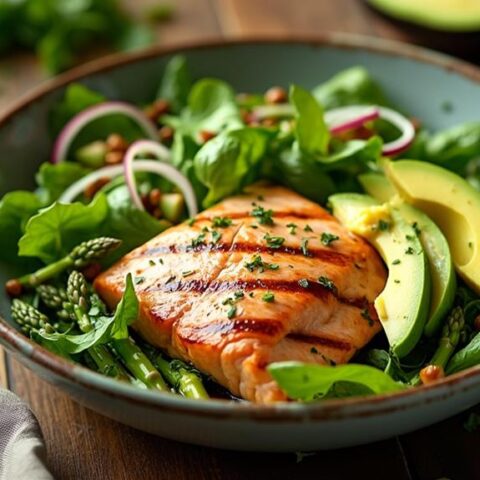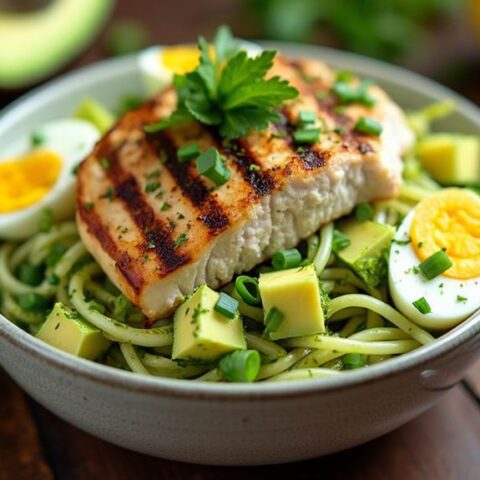
Maintaining ketosis on a ketogenic diet requires avoiding foods high in carbohydrates, such as refined carbohydrates found in white bread and pasta, which disrupt blood sugar levels. Alcoholic beverages, particularly regular and craft beer, increase carbohydrate intake considerably. Sugars and high-carb sweeteners like honey spike blood glucose, negatively impacting ketosis. Starchy vegetables, including potatoes and corn, contain excessive carbs that impede ketogenic adherence. Sugary sodas provide empty calories and high sugar content, leading to insulin spikes. For best results, substituting with low-carb alternatives and understanding these food categories in detail may enhance your keto diet regimen.
Key Takeaways
- Refined carbohydrates, like white bread and pasta, disrupt ketosis due to their high carbohydrate content.
- Regular and sweetened alcoholic beverages, such as beer and cocktail mixers, contain high carbs that exceed keto daily limits.
- High-carb sweeteners, including honey and coconut sugar, spike blood sugar levels and impede ketosis.
- Starchy vegetables, like potatoes, sweet potatoes, and corn, have high carb counts unsuitable for a keto diet.
- Sugary sodas contain excessive carbohydrates and lead to insulin spikes, making them incompatible with keto.
Refined Carbohydrates
Refined carbohydrates, including white bread, pasta, and rice, pose considerable challenges for individuals adhering to a ketogenic diet due to their high carbohydrate content. For instance, white sandwich bread contains approximately 13 grams of carbohydrates per slice, while a single cup of cooked white pasta holds about 33 grams of carbohydrates. Such high levels of carbohydrates can precipitate a rapid spike in blood sugar levels, thereby disrupting the metabolic state of ketosis, which is fundamental to the ketogenic diet's efficacy.
Additionally, starchy vegetables like potatoes and sweet potatoes should also be avoided due to their high carbohydrate content. In contrast, whole grains and natural sugars are often advocated as healthier carbohydrate sources but remain unsuitable for a ketogenic regimen due to their carbohydrate density. Processed snacks, such as chips and crackers, frequently harbor raised levels of refined carbohydrates and added sugars, exacerbating the risk of weight gain and metabolic imbalance.
To mitigate these challenges, individuals can opt for alternatives such as mashed cauliflower or low-carb bread variants made from eggs, nuts, or seeds. These substitutes are designed to maintain low carbohydrate intake while providing essential nutrients.
Meticulous label reading is indispensable to avoid hidden carbohydrates in refined products, as even minimal servings can considerably impact daily carbohydrate limits.
Alcoholic Beverages
Beyond refined carbohydrates, another dietary consideration for individuals on a ketogenic diet is the consumption of alcoholic beverages. Many alcoholic drinks, particularly craft beer and sweetened mixed drinks, are high in carbohydrates. For instance, a regular beer can contain approximately 13-20 grams of carbs per 12-ounce serving, making it unsuitable for a keto diet.
| Beverage Type | Approximate Carb Content (per 12 oz) |
|---|---|
| Regular Beer | 13-20 grams |
| Light Beer | 6 grams |
| Craft Beer | Varies; often higher than regular beer |
| Cocktail Mixers | High due to added sugars |
Sweetened cocktail mixers further exacerbate the issue, as they often contain significant amounts of added sugars, increasing their carbohydrate content. While light beer may offer a lower-carb option with around 6 grams of carbs per 12-ounce serving, it can still impact your daily carbohydrate allowance.
Hard liquors such as vodka, gin, and whiskey are generally low in carbohydrates, but it is essential to avoid high-carb mixers unless opting for sugar-free or low-carb alternatives. Consuming alcoholic beverages can hinder the body's ability to maintain ketosis, potentially leading to setbacks in weight loss and metabolic efficiency.
Sugars and Sweeteners
Managing carbohydrate intake is vital on a ketogenic diet, and consuming sugars and sweeteners can greatly disrupt ketosis. High-carb sweeteners like honey, which contains 17 grams of carbohydrates per tablespoon, and maple syrup, with approximately 13 grams per tablespoon, pose considerable challenges to maintaining a state of ketosis.
These sugars can cause substantial spikes in blood glucose levels, thereby hindering the metabolic state required for a ketogenic diet. It's important to be wary of natural sweeteners like coconut sugar, which is high in fructose and can impair blood sugar control.
Similarly, concentrated sugars found in sweetened beverages and desserts can lead to rapid increases in blood sugar, making these foods incompatible with keto guidelines. Flavored yogurts, often containing up to 20 grams of added sugars per serving, should also be avoided to guarantee carbohydrate intake remains minimal.
Natural sweeteners such as agave nectar and corn syrup are equally problematic, as they contribute excessive carbohydrates that can easily disrupt ketosis.
For those seeking honey alternatives, it is essential to select low-carb options like stevia or erythritol, which do not greatly impact blood sugar levels.
Starchy Vegetables
Starchy vegetables are a vital source of carbohydrates that can quickly derail the stringent carbohydrate limits essential to a ketogenic diet. For instance, a medium baked potato contains approximately 37 grams of carbohydrates, making it highly unsuitable for maintaining ketosis.
Similarly, sweet potatoes, though nutrient-dense, provide around 20 grams of carbohydrates per medium tuber, which can greatly impact the daily carb intake limit. Corn, another starchy vegetable, poses a problem with roughly 27 grams of carbs per cup, necessitating its avoidance on a keto regimen.
Peas, often considered a healthy side dish, contain about 12 grams of net carbohydrates per cup, making them a poor choice for those adhering to ketogenic principles.
Butternut squash and yams are other examples of starchy vegetables that pose challenges; butternut squash has over 15 grams of net carbs per cup, further complicating the ability to remain in ketosis. It is essential to be aware of high-carb vegetables that could jeopardize your ketogenic goals.
For individuals committed to a ketogenic lifestyle, potato alternatives and low carb veggies such as cauliflower, zucchini, and broccoli are preferable. These options provide necessary nutrients while keeping carbohydrate intake within the required limits for sustained ketosis.
Sugary Sodas
Sugary sodas present a significant challenge for individuals adhering to a ketogenic diet due to their high carbohydrate content. A typical 12-ounce can of Coca-Cola contains approximately 39 grams of carbohydrates, which can easily surpass the daily carbohydrate limit of a strict keto regimen.
These beverages offer zero nutritional value, contributing only empty calories that can impede weight loss efforts and overall health improvement. The high sugar content in sugary sodas induces insulin spikes, which can disrupt the metabolic state of ketosis.
Maintaining ketosis is critical for the ketogenic diet's efficacy, and insulin fluctuations can thwart this objective. Additionally, the regular consumption of sugary sodas is associated with increased cravings for other high-carbohydrate foods, thereby complicating adherence to the keto lifestyle.
Health risks associated with sugary sodas extend beyond ketosis disruption. They have been linked to obesity, type 2 diabetes, and cardiovascular diseases.
To mitigate these health risks while ensuring proper hydration, individuals on a keto diet should consider hydration alternatives such as sugar-free beverages or sparkling water. These options help maintain hydration without exceeding carbohydrate limits, thereby supporting the overall goals of a ketogenic dietary plan.
Frequently Asked Questions
What Foods Can You Not Eat on Keto?
To avoid keto pitfalls and guarantee effective carb counting, one should exclude high-carb fruits like bananas, grains such as rice, starchy vegetables like potatoes, added sugars including honey, and legumes such as black beans from their diet.
What Are the Golden Rules of Keto?
The golden rules of the keto diet include limiting carbohydrate intake to 20-50 grams per day, prioritizing healthy fats for 70-75% of daily calories, and consuming moderate protein. Adherence mitigates keto misconceptions while maximizing keto benefits.
What Are the Top 10 Keto Foods?
The top 10 keto foods include fatty cuts of meat, low-carb vegetables, full-fat dairy, and keto-friendly snacks like macadamia nuts. These foods are rich in healthy fats and proteins, essential for maintaining ketosis while providing crucial nutrients.
What Foods Do Not Break Ketosis?
Foods that do not break ketosis include keto-friendly snacks like macadamia nuts and chia seeds, low-carb vegetables such as spinach and zucchini, and healthy fats from sources like avocado and olive oil, all maintaining low carbohydrate intake.
Conclusion
Adherence to a ketogenic diet necessitates the avoidance of certain food categories to maintain a state of ketosis. Refined carbohydrates, alcoholic beverages, sugars and sweeteners, starchy vegetables, and sugary sodas are particularly detrimental due to their high carbohydrate content, which can disrupt metabolic ketosis. Understanding and eliminating these foods from the diet is essential for achieving and sustaining the metabolic benefits associated with ketogenic nutrition, including enhanced fat oxidation and stabilized blood glucose levels.










No Comments